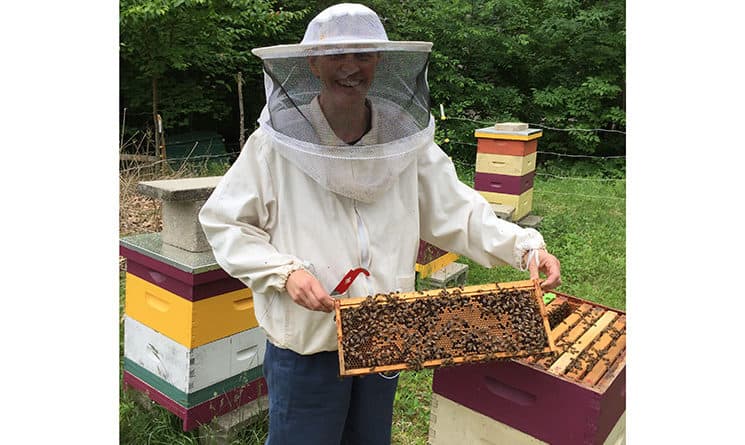and food on our plates
Amy Antonucci loves her honeybees. Standing in the apiary — the technical term for a place where honeybees are kept — outside her Barrington home, Antonucci talks to her bees as she tends to them on an overcast day.
“They’re not going to like this rain,” she says.
Antonucci has been keeping bees for a decade. “They’re fascinating creatures who give us something awesome,” she says.
That “something awesome” is honey, of course, but Antonucci is quick to add that honeybees do more than provide a sweet treat. They help keep plants and trees growing, which keeps food on our plates and flowers in our gardens, among other things.
Above and at top: Amy Antonucci tends to her bees in Barrington.
Honeybees aren’t the only pollinators, though. More than 200,000 species, including insects like beetles, ants, wasps, butterflies, and a variety of bees, as well as small mammals, bats, and hummingbirds, act as pollinators, according to the North American Pollinator Protection Campaign. Those pollinators keep blueberries, coffee, melons, almonds, and about 1,000 different food plants thriving.
Pollinators are having a difficult time, though, according to Sandra Rehan, an assistant professor of biology at the University of New Hampshire. That’s why she, along with Cathy Neal, a professor with the university’s Cooperative Extension, are hosting Pollinator Appreciation Day on June 17. The event, which takes place at the Woodman Horticultural Research Farm on the Durham campus, includes talks on research on native local pollinators, a look at the UNH Bee Hotel, and a meeting for farmers and landscapers to talk about how to help pollinators thrive. The event coincides with a national Pollinator Awareness Week.
“The day is really to bring attention to native pollinators, what people can do to help them, what things are harmful to them, and making our research available and open to the public,” Rehan says.
Honeybees are the most well-known pollinators, but they’re not native to America, according to Rehan. European settlers brought them over to the country a few hundred years ago. Her research is focused on the 200 or so species of native bees that live in the Seacoast region, including carpenter bees, bumblebees, and sweat bees — small bees with a metallic green color that are attracted to the salt in human sweat.
“There’s a lot of diversity,” she says.
Honeybees are one of over 200,000 species of pollinators.
Another difference between honeybees and native species: honeybees are social insects — they live together in hives, after all. But many native bees are solitary. That trait led to the creation of the Bee Hotel, according to Cathy Neal.
“The Bee Hotel is a good educational tool … it’s gotten more attention than we ever anticipated,” she says. “It’s a way to concentrate different kinds of spaces these solitary bees might find attractive” for nesting.
Pollinators of all varieties are facing challenges, including climate, lack of habitat, pesticides, and decreased availability of food. Bees, for instance, are vulnerable to parasites like varroa mites and other diseases. And, as pollinators have a more difficult time, so does agriculture.
“Seventy-five percent of crops need to be pollinated by insects,” Neal says. “And in terms of environmental conservation, they’re a real key species to help maintain our biodiversity.”
How can people help out? Along with learning more about pollinators and getting to know native species, Rehan says planting flowers throughout the seasons can go a long way toward keeping pollinators healthy.
“We’re learning more and more that the declining pollinator population is due to declining floral resources,” she says. “It’s important not to have (flowers) in just one season but in spring, summer, and autumn, so bees can continuously be foraging. It’s really the best thing local citizens can do for the bees.”
For a full list of Pollinator Appreciation Day events, click here.

